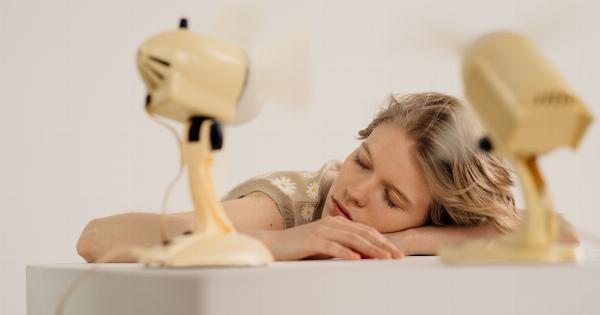Sleeping with a fan is a common practice during hot summer nights. The gentle breeze created by the fan can make falling asleep much more comfortable.
However, there have been concerns and debates about whether sleeping with a fan can have any negative effects on our health. In this article, we will explore the potential impacts of sleeping with a fan and whether they are truly harmful or just myths.
The Science of Sleeping with a Fan
Before delving into the effects, it is essential to understand how sleeping with a fan works. Fans work by creating air movement, which can create a perceived cooling effect on our bodies.
This is the reason why fans are widely used to combat the discomfort caused by hot weather.
Does Sleeping with a Fan Cause Sinus Problems?
One of the most common concerns associated with sleeping with a fan is the potential for sinus problems. Some people claim that the constant stream of air can dry out the nasal passages, leading to congestion and even sinus infections.
However, there is insufficient scientific evidence to support this claim. While it is true that fans can reduce humidity in a room, it is unlikely to cause significant harm to the sinuses. In fact, many people find that the circulating air can alleviate symptoms of allergies or congestion.
Can Sleeping with a Fan Make You Sick?
Another claim often brought up is that using a fan while sleeping can make you sick. The belief stems from the idea that a fan circulating air may also circulate dust and other particles, thereby increasing the risk of respiratory infections.
However, the risk of getting sick solely due to sleeping with a fan is extremely low. The key to preventing illness lies in maintaining good indoor air quality, ensuring proper ventilation, and regular cleaning of the fan to remove any accumulated dust.
Debunking the Hypothermia Myth
There is a common misconception that sleeping with a fan throughout the night could cause hypothermia. Hypothermia occurs when the body temperature drops significantly below the normal range.
However, a typical electric fan is unlikely to cool a room to the extent that it would cause hypothermia, especially when we are adequately covered by blankets or clothing. Our bodies regulate their temperature naturally, and a fan can help with temperature regulation but is unlikely to cause hypothermia unless used in extremely cold conditions.
Effects on Skin and Hydration
Some individuals worry that sleeping with a fan blowing directly on their faces can lead to dryness of the skin. While the constant breeze may cause some dryness, it can usually be counteracted by applying moisturizers or using a humidifier in the room.
As for hydration, fans do not directly dehydrate us. However, if the fan is coupled with an air conditioning unit, the air conditioning can reduce humidity, which may increase the body’s water loss through evaporation.
Therefore, it is crucial to stay sufficiently hydrated and use a fan in conjunction with a reasonable temperature setting on your air conditioning unit.
Impact on Sleep Quality
While fans can provide a soothing sound and create a pleasant sleep environment for many, they can also have the opposite effect for some individuals. The white noise generated by fans can help drown out disruptive sounds and promote sleep.
However, if the fan is excessively loud or makes irregular noises, it may disrupt sleep patterns. It’s important to find a fan with an acceptable noise level that won’t hinder the quality of your sleep.
Potential Allergies and Asthma
Individuals with allergies or asthma may wonder if sleeping with a fan could aggravate their conditions.
While it is true that fans can stir up dust and allergens, regular cleaning of the fan blades and ensuring good indoor air quality can mitigate this risk. Additionally, using high-quality air filters or purifiers can help reduce allergens in the environment, further minimizing the impact on allergies or asthma symptoms.
Benefits of Sleeping with a Fan
Despite the aforementioned concerns, there are several potential benefits to sleeping with a fan. Firstly, the cooling sensation provided by a fan can improve comfort, allowing for a more restful sleep.
Secondly, the gentle airflow can promote air circulation in the room and reduce stuffiness. Lastly, the white noise generated by a fan can act as a sleep aid by masking other background noises and promoting relaxation.
Conclusion
Sleeping with a fan can have both positive and negative effects, but for the majority of individuals, the benefits outweigh the potential drawbacks.
As long as the fan is cleaned regularly, the room is well-ventilated, and moderate temperature settings are maintained, sleeping with a fan can provide a comfortable environment for a good night’s sleep. It is important to listen to your body and adjust fan usage based on personal comfort levels. Ultimately, the decision to sleep with a fan is subjective and depends on individual preferences and health conditions.































